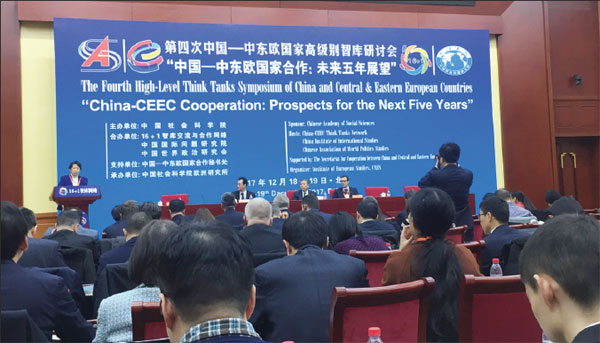New drivers urged for China-CEEC trade

About 300 researchers, officials and journalists from China and 16 CEE nations attended the two-day, fourth High-Level Symposium of Think Tanks of China and Central and Eastern European Countries from Dec 18 to 19. [Hu Yongqi / China Daily]
Think tanks from Central and Eastern European countries met with their Chinese counterparts in Beijing to contribute their thoughts on how to promote China-CEEC cooperation in trade and alignment with the Belt and Road Initiative.
About 300 researchers, officials and journalists from China and 16 CEE nations attended the two-day, fourth High-Level Symposium of Think Tanks of China and Central and Eastern European Countries, which was hosted by the Chinese Academy of Social Sciences.At the symposium's opening ceremony on Dec 18, Vice-Foreign Minister Wang Chao called for accelerating the building of the China-Europe land-sea express line, expanding trade and promoting investment facilitation in efforts to boost trade by improving transportation infrastructure in the region.
He said new growth drivers should be developed in areas such as small and medium-sized enterprises, industrial parks and exchanges of local governments.
In the first nine months of the year, China-CEEC trade volume hit $49 billion (41.4 billion euros; £36.6 billion), a year-on-year increase of 14 percent, according to the General Administration of Customs. As of October, China's accumulative investments in the region reached $9 billion.
China and the 16 CEE nations signed 40 agreements to promote cooperation in a range of fields including finance during the sixth Meeting of Heads of Government of China-Central and Eastern European Countries in Budapest, Hungary, said Wang.
Cai Fang, vice-president of the Chinese Academy of Social Sciences, said China can achieve about 6.8 percent economic growth this year, and China's goal for the GDP in 2020 to be double that of 2010 can be achieved as long as the world's second-largest economy grows by about 6.4 percent year-on-year in the next three years.
"We would like to see CEE nations share the benefits of China's development," Vice-Minister Wang said.
Chen Dawei, vice-president of the China-EU Association, said key areas of China-CEEC cooperation, also known as the "16+1" mechanism, should be highways, railways, airports and ports, in addition to cooperation in new energy and nuclear power generation. The improvement of transportation infrastructure in CEE nations will be good for the European Union, he said.
Experts say CEE nations also want to export more agricultural goods to China and attract more tourists and investment from the country.
Bulgaria will hold the rotating presidency of the EU in the first half of next year and will also host the seventh Meeting of Heads of Government of China-CEEC next year.
Valentin Katranjiev, chief expert of the training and research projects department at the Diplomatic Institute of the Bulgarian Foreign Ministry, said Bulgaria can take a bigger share in the Chinese market with its advantages in the agricultural sector, including world-famous rose-related products.
Bulgaria also should work with China on innovations to bring added value, in addition to traditional areas such as railways, highways and logistics centers, he said.
Tourism can also be a good area, since it is estimated that by 2020, 2 million trips will be made between China and CEE nations, Vice-Minister Wang said.
Last month, China signed a visa-free agreement with the Balkan country Bosnia and Herzegovina. Amel Kovacevic, head of retail banking at Bosna Bank International who has been traveling between his country and China since 2010, said more Chinese visitors are welcome to visit the country.
Also in Budapest, Estonia, Lithuania and Slovenia signed memorandums of understanding to promote the Belt and Road Initiative, signaling that all 16 CEE nations have agreed to work under the initiative.
China-CEEC cooperation is a cross-regional platform, born against the backdrop of rising globalization, and will be beneficial to participating countries and China-Europe cooperation, Wang said.
Katranjiev said "16+1" cooperation is beneficial to CEE countries in social and economic development and helps to bridge the economic difference between Eastern and Western Europe.
"People in southeastern Europe believe the"16+1" mechanism is not a threat to the EU integrity, but rather it helps to strengthen EU unity and speed up our industrialization," he said.

